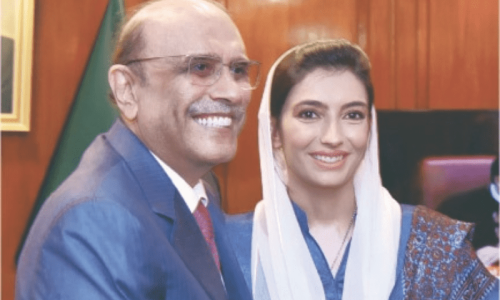ISLAMABAD: The newly introduced reforms in the civil service are like old wine in a new bottle as most of the key measures announced by the government to stop promotions and take punitive actions against delinquent civil servants were part of the laws introduced by former military ruler retired Gen Pervez Musharraf, observers say.
Talking to Dawn, Adviser to the Prime Minister on Institutional Reforms Dr Ishrat Hussain said that the reforms of Gen Musharraf’s era were introduced through an ordinance or notified through the Establishment Division like routine business and parts of them were later struck down by courts. “This time the changes are in conformity with the Civil Service Act and other related laws,” he said.
“We made a mistake at the time that we waited for a year to introduce the reforms; however, by the time we finalised the reforms package, the Musharraf government was already on its exit,” Dr Hussain said.
The federal government on Wednesday unveiled the reforms for civil bureaucracy that would pave the way for ‘forced’ retirement of delinquent officials and introduce tough criteria for promotion of the bureaucrats.
Most of the rules were introduced by Musharraf regime, but later struck down by courts
After toppling the elected government of the then prime minister Nawaz Sharif, Gen Musharraf promulgated the Removal of Service (Special Powers) Ordinance 2000 on May 27, 2000 that enabled the competent authority to sack incompetent officers.
According to a former bureaucrat who had served in the Establishment Division and is well versed with the civil service laws, most of the reforms introduced by the PTI government were chalked out in the Musharraf era and had created unrest among the bureaucracy.
He said under the Civil Servants (Directory Retirement from Service) Rules 2020, grounds for directory retirement included adverse remarks in three personal evaluation reports (PERs) or three average PERs, being twice superseded for promotion to BS21 or below or not being recommended for BS-22 and having opted for plea bargain or voluntary return.
According to him, supersession is itself a punishment and it would be double jeopardy if an official was removed from service because of being superseded.
He said that the concept of an inquiry against a civil servant through competent authority was also introduced in the past, but it was not a time-saving methodology. “Now the government has fixed a timeframe of 105 days to conclude the inquiry, but I doubt that this would be possible.”
“There are certain statutes providing for such a timeframe. For example, the Anti-Terrorism Act asks the anti-terrorism court to conclude a trial in a couple of weeks and the National Accountability Ordinance sets a 30-day timeline to conclude a trial, but not a single trial in these courts is concluded within the timeframe,” he said.
“The reforms set a deadline to conclude the inquiry in 105 days, but practically it takes months to complete this exercise and nobody ever dares question the inquiry officer over delay,” the former bureaucrat said.
As part of reforms, the government has notified the promotion rules. Federal Minister Shafqat Mehmood on Wednesday said that weightage for promotion included personal evaluation reports 40 per cent, training 30pc and evaluation by the Central Selection Board 30pc.
A senior bureaucrat said that the Establishment Division in 2002 made it mandatory for a civil servant to pass entry test before proceeding to a professional training course for further promotion. Since the District Management Group introduced this condition, the other occupational groups (cadres) went to the court and this condition was set aside finally, he said.
Dr Ishrat Hussain said that there might be some similarities in the old and existing laws; however, the reforms had been notified after a careful study and keeping in mind the loopholes of the past.
“We have examined individual rules and got them approved by the parliament”, he said.
In the past, the Removal of Service Ordinance did not provide due course and sacked officials approached courts against their terminations saying that they were not given the opportunity of hearing, he said. Now the Civil Servants (Directory Retirement from Service) Rules, 2020 had laid down due course to remove incompetent officers, he added.
He defended sacking of incompetent officials saying “we cannot treat hardworking and lethargic officials equally”. According to him, sacking of an incompetent official whose performance is rated as below average for three consecutive years is justifiable.
The PM’s adviser said that the Islamabad High Court had already cleared the promotion rules in which the government had ensured merit-based promotions. “For promotion in BS-22 we have introduced performance-competence-integrity criteria instead of seniority-cum-fitness criteria.”
Because the government had started induction of managing directors and chief executive officers of the autonomous bodies on merit, highly qualified professionals were now applying for these posts even from foreign countries, he said.
Published in Dawn, January 22nd, 2021














































